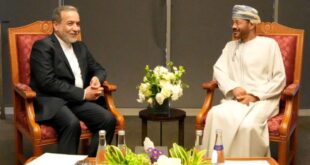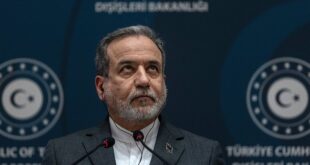 TEHRAN (Reuters) — Iran said on Sunday it would reject any demand to stop what it calls peaceful nuclear work, a day before Europe’s foreign ministers discuss incentives and penalties designed to rein in Tehran’s atomic ambitions.
TEHRAN (Reuters) — Iran said on Sunday it would reject any demand to stop what it calls peaceful nuclear work, a day before Europe’s foreign ministers discuss incentives and penalties designed to rein in Tehran’s atomic ambitions.
European Union foreign ministers meet on Monday to work out technical, trade and political sweeteners that would be offered to Iran in exchange for allaying Western fears it is seeking to produce an atom bomb, notably by halting uranium enrichment.
Iran, the world’s fourth largest oil exporter, insists its nuclear plans are purely to make electricity and says it will not give up enrichment, a process which can used to make fuel for power stations but also material for weapons.
“Any proposal that obliges us to stop peaceful [nuclear] activities would not have value and would not be valid,” Iranian President Mahmoud Ahmadinejad said in a speech broadcast on state television.
He accused the Europeans of living in a “colonialist world” and said Tehran would not accept decisions reached in Brussels.
“If they want to decide things that concern us in a place where we are not present, then that body does not have any legal validity or credibility in decision-making,” Ahmadinejad said.
Washington and its European allies have been seeking to pass a UN Security Council resolution that would oblige Iran to halt all uranium enrichment work or face possible sanctions.
But Russia and China, which have energy interests in Iran, have resisted the move. Washington agreed to let Britain, France and Germany devise a package of benefits for Iran in return for cooperating, putting back a decision on a possible resolution.
“The aim is to come up with a very attractive package to make it difficult for the Iranian government to refuse,” said a senior envoy from one of the so-called “EU3” countries.
A draft statement for Monday’s EU meeting obtained by Reuters stated the bloc was ready to help Tehran develop “a safe, sustainable and proliferation-proof civilian nuclear programme” while insisting it halt all enrichment on its soil.
EU officials said it was undecided if help could include letting Western firms build nuclear power stations in Iran, an offer sources said was in an earlier package rejected by Iran last August and which also stipulated an end to enrichment.
Best incentive
The EU wants the package ready by a meeting on Friday in London of the five permanent Security Council members plus Germany.
Afghanistan has also offered to mediate between Washington and Tehran, Afghan Foreign Minister Rangeen Dadfar Spanta was quoted on Sunday as saying.
Spanta told Germany’s Bild am Sonntag newspaper that he and Afghan President Hamid Karzai planned to travel to Tehran at the end of May to assess the “room for manoeuvre” for a peaceful resolution to the conflict.
Several Iranian officials have recently focused on saying Iran must be allowed to keep at least an enrichment research programme, suggesting Tehran might be ready to scrap plans for industrial-scale production of uranium fuel as part of a deal.
“We should first see what the [EU] proposal is. Anyway, we will not abandon our right. [Nuclear] research and development will remain on Iran’s agenda,” foreign ministry spokesman Hamid Reza Asefi told a weekly news conference.
But Washington has said all such work must stop and the draft EU proposals rules out even enrichment for research.
Western diplomats say keeping even a small-scale enrichment programme at home would enable Iran to master a technology that could quickly be expanded for military purposes in the future if Tehran chose.
Iran argues that its right to enrichment is enshrined in the nuclear Non-Proliferation Treaty (NPT), which allows signatories to carry out the whole range of research, development and production activities to produce nuclear energy.
“I think the best incentive is that they implement the regulations of the NPT,” Ahmadinejad said.
Western diplomats say Iran would have such rights only if it could prove its aims are entirely peaceful but the UN nuclear watchdog, the International Atomic Energy Agency, says it still cannot give Iran a clean bill of health. Diplomats say the IAEA head, Mohammad Al Baradei, has privately told Western leaders they may have to accept a limited Iranian enrichment programme under IAEA monitoring as it was a matter of national pride and to insist on scrapping it may only bolster Iranian conservatives opposed to any compromise.
 Eurasia Press & News
Eurasia Press & News


